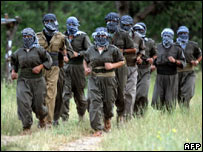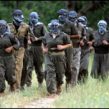Provision to Turkey of U.S. Intelligence on PKK Highlights Policy Shift
Publication: Terrorism Focus Volume: 4 Issue: 36
By:

The 2007 edition of the annual offensive of the Kurdistan Workers’ Party (PKK) against Turkey has displayed the group’s adaptability and its tenacity. It has included a multi-front strategy, with both urban terrorist-style attacks in cities such as Istanbul (Terrorism Focus, October 10) and the more traditional small-unit guerrilla operations in southeast Turkey. The guerrilla tactics this year, however, encompassed an increase in the use of improvised explosive devices that resulted in an upsurge in Turkish casualties (Terrorism Focus, June 26). In just one battle on October 21, more than a dozen Turkish troops were killed, 17 wounded and eight more captured and taken back to the PKK’s Iraqi mountain redoubt (Hurriyet, October 22). After initially limiting its response to cautioning Turkey not to invade northern Iraq / Kurdistan, U.S. policy shifted and the United States is now providing Turkey with intelligence data on the PKK presence.
Stung by the continuing stream of casualties in higher numbers, Turkey engaged in a very intense public campaign on a worldwide basis, including threats to invade Iraqi territory. Turkey also expressed its outrage at the consideration of a U.S. Congressional Resolution recognizing an alleged genocide campaign against Armenians by Ottoman Turks in the early 20th Century. The combination of these factors, according to Turkey, would severely damage U.S.-Turkish relations.
The damage, primarily to the U.S. military effort in neighboring Iraq, could include decreased access to airfields and roads, according to Secretary of Defense Robert Gates (AP, October 10). A Pentagon press briefing on October 26 by the senior U.S. military official in Northern Iraq, Major General Benjamin Mixon, did little to assuage Turkish fears. In response to a question about his plans vis-à-vis the PKK, General Mixon said that he was planning to do “absolutely nothing” to counter PKK activities in Northern Iraq because he had “not been given any requirements” to do so by higher authorities (www.defenselink.mil, October 26). Simultaneously, though, Washington stated publicly that it was willing to provide “actionable intelligence” to Turkey in countering the PKK (Turkishpress.com, October 23). Subsequently, in a November 2 news conference in Ankara, U.S. Secretary of State Condoleezza Rice stated that Washington was already providing actionable intelligence to Turkey on PKK facilities. Working with the Northern Iraqi provincial government, Secretary Rice said that the number of Turkish-Iraqi border passes has been reduced in an effort to provide more control over the movement of PKK commandos (Asia Times, November 6).
The exchange of intelligence information with other nations, especially in the field of counter-terrorism and with long-time NATO allies, comes as no surprise. In the case of the PKK, for example, its founder and long-time leader, Abdullah Öcalan, was captured in Nairobi, Kenya, in 1999 as a result of intelligence provided to Turkey by a number of other nations (www.kurdistan.org, quoting CovertAction Quarterly, Fall 2002). The very public announcement of the provision of intelligence information, however, coming as it does in the midst of an accelerated diplomatic campaign including even the U.S. Secretary of State, signals a shift in U.S. policy. The signal is intended, of course, to allay the concerns of Turkey; it also is intended to deliver a message to the PKK that it can no longer enjoy the sanctuary of the Qandil Mountains and that its bases are under near-constant watch. Intelligence-producing assets in the Iraq Theater of Operations include unmanned aerial vehicles with the capability to linger over any target, undetected, for extended periods of time. A concentration of PKK guerrillas, for example, would then be an easy target for Turkish aircraft and even artillery fire.
The PKK’s hit-and-run attacks have obviously been troublesome for the Turkish army to combat this year, as shown in the higher numbers of Turkish casualties. Turkey has responded by sending additional troops and paramilitary units to the border area and by enhancing the training of those deployed. The addition of more detailed intelligence on PKK presence and movements—and its provision to Turkey in near-real-time—will enhance Turkey’s operations. The effects may not be noticeable until the spring of 2008 because the PKK ingress and egress routes, as usual, will be virtually impassable until then.




